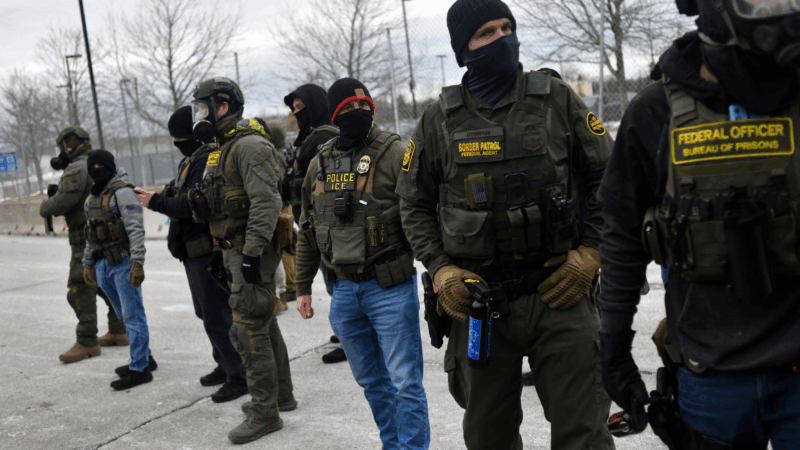Green card holders, travelers caught in Trump’s immigration crackdown
When Madonna Cristobal landed at the airport near Seattle in February, she and her aunt waited in the same line for customs.
Cristobal, a U.S. citizen, sailed through. Then she waited for her aunt. And waited.
“One hour, two, three hours,” Cristobal said. “I started to worry, and then I’m like, ‘Oh, what the heck is going on?'”
Cristobal’s aunt, Lewelyn Dixon, had been detained by U.S. Customs and Border Protection.
Dixon is a lawful permanent resident who has lived in the U.S. for 50 years, since the family immigrated to the U.S. from the Philippines. She has traveled internationally many times with her green card and never had any trouble coming back to the U.S. — until now.
“We had a great time visiting our homeland, visiting family,” Cristobal said. “My aunt don’t deserve this.”
It was only after Cristobal and her sister hired a lawyer that they found out why Dixon, who is 64 years old, was detained.
A felony conviction for embezzling nearly $6,500 from the bank where she worked more than 20 years ago is still on her record. At the time, Dixon pleaded guilty and paid a fine, according to her lawyer. She never served any jail time, though she did spend a month in a halfway house.
But now, any past infraction can loom large as immigration authorities ramp up enforcement at airports and borders crossings.
“It’s maximum enforcement these days,” said Benjamin Osorio, an immigration lawyer who is representing Dixon.
Traveling to the U.S. from abroad has gotten riskier under the Trump administration’s crackdown — even for people with valid visas and green cards, immigration lawyers say.
“There isn’t a lot of explanation,” said Ben Johnson, the executive director of the American Immigration Lawyers Association.
“There isn’t a lot of consistency on what they’re doing except trying to find any and every reason to prevent people from coming back into the United States and any and every reason to try to kick people out of the United States,” Johnson said.
Border officials are taking a harder line with green-card holders who have minor offenses on their records. That includes Fabian Schmidt, a New Hampshire man originally from Germany who was detained, possibly because of a decade-old misdemeanor charge for marijuana possession in California that was later dismissed.
International tourists have been swept up, too. Two German visitors were detained in California over suspicions that they were planning to work or stay permanently in the United States.
And a backpacker from the United Kingdom was held for three weeks because of a mix-up with her visa. Her father, Paul Burke, says she was transported to the airport for deportation in shackles.
“She’s not Hannibal Lecter,” Burke told the BBC.
In a statement, Customs and Border Protection (CBP) says it is simply enforcing immigration laws.
“Those who violate these laws will be processed, detained, and removed as required,” CBP Assistant Commissioner Hilton Beckham said in a statement to NPR. “Green card holders who have not broken any U.S. laws, committed application fraud, or failed to apply for a re-entry permit after a long period of travel have nothing to fear about entering and exiting the country.”
Border officers have always had a lot of discretion when deciding whom to allow into the country, says former CBP Commissioner Gil Kerlikowske, although he questions whether this heightened scrutiny is the best use of resources.
“Some of these detentions don’t seem appropriate,” Kerlikowske said. “Especially if it was a relatively minor charge. I mean, that’s just a waste of taxpayer dollars.”
Several countries in Europe have updated their travel guidance for the United States. The German government warned that false information, past criminal records or even minor visa overstays could lead to arrest, detention and deportation.
It’s hard to say how many green-card holders or travelers have been detained. But immigration lawyers say there are likely more of these cases that haven’t been reported.
Lewelyn Dixon’s detention has devastated her family.
“Auntie Lynn has been the rock of our family,” said Cristobal, Dixon’s niece. “She has been what you would call an older sister to us, more than an auntie, because she’s been through our marriages, our divorce, our pregnancies, our children’s birth.”
Dixon left the Philippines when she was 14, along with Cristobal and her siblings, helping them build a new life in the United States.
Cristobal lives with her aunt in Edgewood, a suburb of Seattle. She had to call her aunt’s boss at the University of Washington, where she works as a lab tech, to explain why Dixon wouldn’t be able to make it in.
A few days later, Dixon was transferred to the Northwest ICE Processing Center in Tacoma, Wash., where she remains nearly a month later. Her next hearing in immigration court is scheduled for July.
Dixon’s criminal record would likely not be reason enough by itself for authorities to arrest her and try to revoke her green card inside the U.S., according to Dixon’s lawyer. But the rules are different at ports of entry.
“If she had not traveled, she would not be having the issues that she’s having,” Osorio said.
Osorio says he’s advising all his clients who are lawful permanent residents to become naturalized U.S. citizens if they can.
Some immigration lawyers are telling green-card holders not to leave the country, especially if they have any criminal record in their past — no matter how minor.
U.S. military troops on standby for possible deployment to Minnesota
The move comes after President Trump again threatened to invoke the Insurrection Act to control ongoing protests over the immigration enforcement surge in Minneapolis.
Martin Luther King Jr. had a dream … about health care
A doctor from Nigeria tells what Martin Luther King Jr. taught him about health, Justice and inequality.
Sunday Puzzle: It takes two
Ilyse Levine-Kanji of Westborough, Massachusetts plays the puzzle with Weekend Edition Puzzlemaster Will Shortz and host Ayesha Rascoe.
Venezuela: Maduro’s enforcer Cabello still central to power
The ousting of Venezuela's president raised hopes of change — but the politician now controlling the streets shows how little has really shifted.
Amid ICE clashes, New Hampshire bishop urges clergy to prepare their wills
The Episcopal bishop of New Hampshire told priests protesting ICE to get their wills and affairs in order. Some praise the bishop, while other priests say they never signed up to be martyrs.
New York Giants hire John Harbaugh as coach after identifying him as their top choice
Harbaugh joins the Giants 11 days after he was fired by the Baltimore Ravens. The Super Bowl champion is now tasked with turning around a beleaguered franchise.








